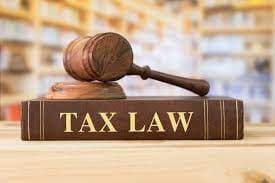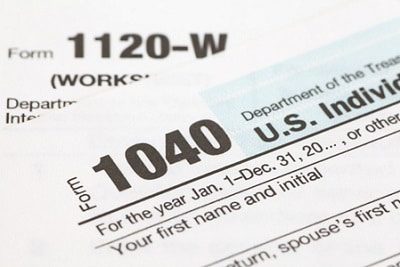Who Is Required To Pay Income Tax?
I want to tell you an amazing story. A story that reveals an equally amazing truth. But hearing truth can be disturbing, even scary, when it conflicts with something you’ve heard, and believed, most of your life. I understand. I hope you’ll stick with me for a few minutes and hear me out.

My Personal Journey With Income Tax Law
As I write these words, it has been 29 years since I last filed a U.S. Individual Income Tax return [Form 1040] or paid a penny of income tax. I’m also the most well-known spokesperson in the United States concerning the truth of the income tax. And here I am, healthy, happy, free as a bird, and excited to share the truth with you!
Just the thought of walking away from the income tax can be scary so it might interest you to know I didn’t hide from the IRS, Treasury Department, or government generally when I did so. In fact, I did exactly the opposite; I reached out to them! I wrote the IRS Commissioner and Chief Counsel of the IRS, as well as the Secretary of the Treasury. These are the Executive Branch officials responsible for enforcement of the income tax. If anyone should know the facts and law, it’s them, right? I told them what I was doing and why. (We’ll get to “why” in a minute.) I knew the subject matter – the law – inside and out. I shared it with them. I invited them to correct me if my understanding of the law was errant in whole or in part. What was their response? Nothing. Silence.
I didn’t stop there! I wrote my Congressperson, my Senators, and the President, inviting them to correct me if I was mistaken in the slightest. Since all income tax statutes (laws) have been passed by Congress, and signed into law by Presidents, the Legislative Branch and the President should certainly know what the law requires of me, if anything, right? What was their response? Nothing. Silence.
I wrote every Justice on the U.S. Supreme Court because it has been pivotal in interpreting Congress’ income tax statutes and the 16th Amendment (which many people falsely believe authorized the income tax to be extended the ordinary American). In fact, I relied heavily on the Court’s decisions. If anyone should be able to inform me of possible errors in my position, it would certainly be Justices of the Court upon whose decisions I was relying. What was their response? Nothing. Silence.
The So-Called ‘Experts’ Of Tax Law
As I became more well-known for speaking publicly about the truth of the income tax, tax reporters, high profile CPAs, and tax attorneys began publicly criticizing me. Great! I invited them to be a guest on the popular radio show I hosted at the time. My invitation was simple: ”Come on my show and prove me wrong. Every show is archived and available to be heard by anyone with internet access. If you present facts and law showing the world I am mistaken, who would listen to me ever again? Rather than criticize me from afar, this is your opportunity to destroy my credibility, forever silence my message, and have your achievement available to the entire world. When are you available?” Over a 12 year period not one – repeat: NOT ONE – of these “experts” were willing to come on the show.

When social media platforms like Facebook, YouTube, and Twitter came on the scene I took the message of the truth there, exponentially increasing my exposure and the truth of income tax. Same story. Criticism without facts or law. To this day I have a standing public offer for anyone with “expert” knowledge of the income tax to debate me publicly. Decades after I learned the truth, still no takers.
More importantly, after of all that national exposure, here I am, happy as a clam, sharing this incredible truth with you – 29 years after walking away from the income tax.
I shared those early stories with you so you know exactly how publicly vocal I’ve been with everyone from the guy down the street to the guy in the White House. When you have the facts and law on your side you needn’t be afraid.
Now the bad news. Nearly all of my research was pre-internet. Or at least pre-useful internet. I can’t even begin to tell you how many hours I spent in law libraries researching the law in order to eventually put all the pieces of the puzzle together. Not only is it a puzzle, but it has been intentionally designed as a labyrinth impenetrable by anyone who is unwilling to put in the years of research I did.
Now the good news. Understanding few of my fellow citizens would follow my path, dedicating years of their lives to researching the subject, I realized the fruits of all those years of research had to be made available to the American people in a single, ease-to-understand, compendium. I have done that for you. Before we get to that, let me share some astounding facts with you.
The History Of The Income Tax
The income tax was passed into law in 1913. While it has gotten exponentially more complex, to whom it applies – i.e. those upon whom Congress has imposed the tax – has never changed. The core fundamentals remain the same today as in 1913.
Treasury Decisions are internal Treasury Department documents detailing Treasury’s interpretation of Congress’ statutes. (Treasury Decisions often provide a formal Treasury Dept position subsequently published as regulations.) Since 1913 eight different Treasury Decisions instruct Treasury Dept employees and the IRS who is to file a Form 1040. It may shock you to learn that every single one states that the person who must file a Form 1040 is a Nonresident Alien with U.S. source income. It may further shock you to learn that since 1913 there is no Treasury Decision, Treasury Order, or regulation in existence stating anyone other than a Nonresident Alien with U.S. source income is to file a 1040.
Isn’t it odd that the Cabinet-level department tasked by Congress with administrating and enforcing the income tax has failed – for more than 100 years – to state that anyone other than a Nonresident Alien is to use Form 1040. (Hint: It’s not a 100+ year oversight.)

Every taxpayer fears an IRS audit (known in law as an “examination”). The Secretary of the Treasury has authorized those examinations, including summonsing a taxpayer’s “books and records”, to be conducted within “internal revenue districts”. There are 33 internal revenue district blanketing the U.S. However – and this is a HUGE “however” – it may surprise you to discover that the Secretary has only authorized those actions in relation to activities taking place at Ports of Entry, Service Ports, and other stations under authority of the U.S. Customs Dept. This may strike you as unbelievable. I get it. I was at one time where you are right now! It’s more than a little unpleasant to find out your government has been pulling wild shenanigans to defraud you. For decades I’ve consistently said I don’t want anyone to believe me. I want you to see it with your own eyes. The story is crazy. It goes like this; Treasury wrote a proposed statute. Congress enacting it. The President signed it into law. The law commands the President to designate “internal revenue districts” without ever defining what those districts are. The President then used an Executive Order to transfer his duty to the Secretary of the Treasury (whose department originally wrote the legislation), who then issued regulations limiting the scope of “internal revenue districts” to only locations under the authority of the Customs Dept. In Income Tax: Shattering The Myths I walk you through the entire process, providing you with the statutes, Executive Orders, and regulations, so not only can you follow along with confidence, but you can readily verify the truthfulness of what you’re learning.
Congress Has Redefined Commonplace Words And Made Up New Words
“How strangely will the Tools of a Tyrant pervert the plain Meaning of Words!” – Samuel Adams
Do you know Congress is free to define “legal terms” in law to mean something entirely different than what 100% of the American public understands them to mean in common speech? This is a common practice, sanctioned by the U.S. Supreme Court, that Congress employs in many areas of law. It is pervasive in tax law. It may also surprise you to learn that when National Archive And Records Administration (NARA) places Congress’ definitions in the Title 26 of the United States Code (commonly known as the “Tax Code”), those definitions are almost always found hundreds of pages away from where the terms are used. Further, in some cases a term is defined vaguely in a statute, with a more precise meaning found in the corresponding regulation. As an example, you may read a word in a statute and think you know what it means, but you can only discover what you assumed it meant is not the meaning given to it by the Secretary of the Treasury. In other words, you read a statute thinking the term means one thing, but unless you also took the time to read the regulation you’d never know the term has an entirely different meaning!
The other game being played to fool you is to put what I call the “Rules of Computation” (which are voluminous) in one place, while placing the far more important statutes and regulation concerning upon whom Congress has imposed the tax in a location no one would ever think to look. It fact, they’ve gone so far as to title that area of the Code in such a way that if a person is searching for the part of the Code in which Congress imposes the tax, when they get to the correct area of the Code they’d think, “This isn’t it. I need to keep looking.”
Let me share with you a few examples of the definition word game. “United States” is used throughout the Code. In some places it means only ‘federal places’ such as Washington DC and federal territories & possessions. In other places it means ‘federal places’ and the 50 states of the Union. If you earn your money in a state of the Union, not understanding pertinent sections mean only ‘federal places’ could be a real problem. “State” is another example. Sometimes it means only ‘federal states’ such as Puerto Rico, Guam, the U.S. Virgin Islands, etc. In other instances it includes the 50 states. How about “Employee”? Everyone knows what that means, right? Not after Congress redefined it as a “legal term”! Depending on the section you’re reading, “employee” can be limited to certain people selling life insurance (in a very limited circumstance) or to federal government workers and/or ‘federal state’ workers. It may shock you to learn that Congress has never defined “employee” (in all its various definitions of the term) to mean the average Joe (or Jane) working in the private sector, earning his/her own domestic income within 50 states.
The Tax Code Was Written To Deceive
What you’ve just read is not a list of conveniently cherry-picked exceptions to how the Tax Code is structured. What you’ve read is a partial list of legal trickery the government has used across the board to intentionally bamboozle you. Since the Code is massive and seemingly impenetrable to the vast majority of the public who are unaware of the tactics being employed to bamboozle them, the government can rest easy that its intentional scam will never be recognized by the American people. Furthermore, they know if these facts were to become widely known the government can simply say, “We put it all in there. You’re upset because you didn’t read it properly?” While that response would be accurate, it fails to acknowledge the reality that the government has done everything in its power to obfuscate the truth and make it (nearly) impossible for you to discover. You discovery the truth is where I come in!

Earlier I mentioned that I understand I am one of the few people who would dedicate the years required to gain a complete command of the fraud being committed upon the American people by the U.S. government. You may wonder why I was willing to do that. I grew up in a middle class home. I was imbued from a young age with the perspective that in America the government is the servant of the people and respect for unalienable rights is what separates American from every other nation on earth. As you’ll discover in Income Tax: Shattering The Myths, the reason the government had to resort to scamming the American people into the false belief they owe income tax is because the principles enshrined in the U.S. Constitution prohibit Congress from imposing an income tax on the ordinary domestic earnings of the American people.
Those prohibitions still exist today!
Like me, you may have been taught in school that the 16th Amendment authorized Congress to impose an income tax on the ordinary domestic earnings of the American people. If so, you might enjoy discovering that the U.S. Supreme Court ruled the 16th Amendment conferred no new powers of taxation on the national government and anything not taxable by Congress before the adoption of the 16th Amendment (i.e. ordinary domestic earnings of the American people) remained nontaxable after the adoption of the Amendment. Since the Supreme Court stated that just as plainly in its decision as I shared it with you here, why do government school teach something that is not only false, but demonstrably false?
I was an Army Ranger. I did as I was ordered, believing I was serving the interests of my fellow citizens. When I got home I went into law enforcement and willingly put myself in harm’s way for the purpose of assisting my fellow citizens to live with the same freedoms I so greatly cherish. After several years in law enforcement I moved into the private sector, starting my own business. At no time did my commitment to a government by and for the people waiver. For America and its citizens to thrive, government must be a servant of the people. Then, by events I describe in Income Tax: Shattering The Myths, I learned something was amiss. It appeared the government was preying on the American people without the required constitutional authority. As an American citizen I could not stand idly by if such was actually occurring. If the situation was as it appeared, it would mean the U.S. government had breached any semblance of faith with the American people. I had to know.
Thus began 17 years of research during an era in which the internet had not yet matured and virtually nothing I needed was online. I began researching with a passion. As progress was made and things heated up I rented passenger vans and took teams of researchers to various law libraries. Each team of researchers had a list of specific items that needed to be located that day. Some items were easily located. Others, often from the period between 1913 and World War II, would have to be dug out of basement storage by the law librarians (who are amazing professionals). Over the next few weeks a small team of researchers would evaluate the trove of documents, connecting them to other significant statutes, regulations, Treasury Decisions, etc. Some documents were meaningless and tossed in the trash. Others were like striking gold. After the analysis was done we’d make a list of new documents we needed and repeat the process again…and again….and again… When others were not available I’d hit the law library by myself. I honestly can not tell you how many hundreds of hours I spent in law libraries locating, reading, taking notes, and photocopying pages of tax law and related documents.
Digging Into The Tax Code
One of the most arduous task was tracking down parts of a single piece of legislation that, when placed in the Code (i.e. codifying), were scattered far and wide. Imagine a piece of legislation that addresses a single tax. It contains subjects such as 1) upon whom that particular tax is imposed, 2) under what circumstances, and 3) requirements to report, file, and pay. When NARA codified those elements it would often break the original legislation apart and place those elements in different areas of the Code. As an example, the section concerning under what circumstances the tax is imposed would be placed in Chapter 35 of Subtitle D. Upon whom the tax is imposed would be placed in Chapter 3 of Subtitle A. Issues such as reporting, filing, and paying, would be split between Chapters 61 & 62 in Subtitle F. Viewing those element separately, without knowing they came from a single piece of legislation addressing a single tax enacted 60 years ago, it is easy for those elements to be confusing and give the reader a completely false impression as to what a single disjointed portion applies. If you tasked a think tank with devising a method by which the public would never learn the truth about a particular area of law, it’s a good bet this tactic would be a big part of its recommendation.
In short order it became clear something was seriously amiss. But knowing something is amiss is not the same as being able to isolate and identify it. Identifying the broad strokes of the scam took a few years. Assembling and understanding all the constituent parts of the scam, a few years more. Because I know people often reject new information that contradicts a long-held belief, I felt it was important to dot every ‘i’ and cross every ’t’. Accordingly, then began the painstaking work of assembling a catalogue of evidence that would convince even the most ardent skeptic. My initial suspicions were raised by a thimbleful of information. Over time the evidence could fill a cup. Then a bucket. Then a bathtub. Then a lap pool. Eventually ending up filling an Olympic-size swimming pool with facts & law proving the U.S. government is committing the largest financial crime in world history – against its own citizens.
Again I return to the idea that 99.9% of Americans would never follow my path to learn what I and my fellow researchers unearthed. I get it. I just happened to be the right man, at the right place, at the right time, under the right circumstances, with the right skillsets and the passion to do what was required. Of course I didn’t do it alone. Not only did many good people come along side me with their own passion for truth, but there were hundreds of people who came before, uncovering various parts of the truth, but not having enough to see the complete picture.
The Income Tax Myth Shattered
In 2009 I began writing Income Tax: Shattering The Myths. In it I provide unassailable evidence proving what the U.S. government has been doing; knowingly, willfully, and intentionally. I managed to pack everything you need to know into 400 pages. More importantly I’ve laid it out in an easy to understand style so every reader can be confident of his/her knowledge. Also, every statute, regulation, Treasury Decision, Treasury Order, court decisions, etc., appears in the text, as well as in the Index. Furthermore, a “Table of Authorities and Notes” by chapter is provided. These resources are included in the event you choose to verify the factualness of what you learn in Income Tax: Shattering The Myths.
One last example of how the scam has been run before I let you get on with ordering Income Tax: Shattering The Myths. The term “US person” in the Tax Code bears directly upon issues with which many Americans are familiar, such as Form W-9 and Form 1099. “US person” is defined as a US citizen or resident, a domestic corporation, partnership, estate or trust. In other words, you must be one of those things to be a “US person”. Most Americans – not understanding the scam – presume they are US persons. However, the definition fails to include what a US citizen or resident, domestic corporation, partnership, estate or trust, must be doing to be considered a “US person” for the purposes of the income tax. The term “US person” was first introduced into the Tax Code by statute in 1962. In the 7 decades since the term was placed in the Tax Code, every single regulation employing “US person” describes a US citizen or resident, a domestic corporation, partnership, estate or trust, being the recipient of U.S. source income belonging to a foreign person. In 7 decades the Treasury Department has not issued a single regulation in which a “US person” is the recipient of his/her own domestic source income. Not one! Why? Because the scope of the income tax is, and always has been, very narrow and does not embrace any American living and working in one of the 50 states, earning his own domestic income.

Considering all that you’ve read here, it may surprised to know that this information barely scratches the surface. There is much much more to the story! My mantra for almost 3 decades has been, “Please do not believe me.” Not only do I not want you to believe me, you don’t need to. When you close the final page of Income Tax: Shattering The Myths you will have zero doubt what the truth is. What you do with that truth is up to you.
